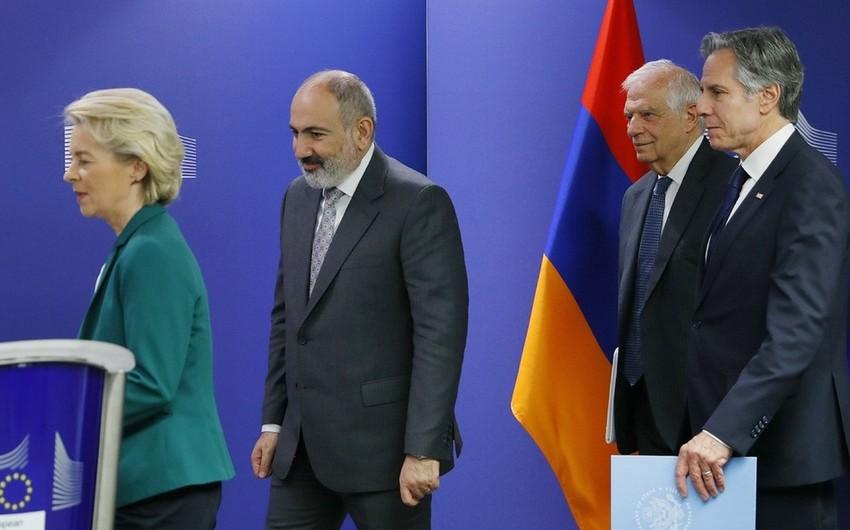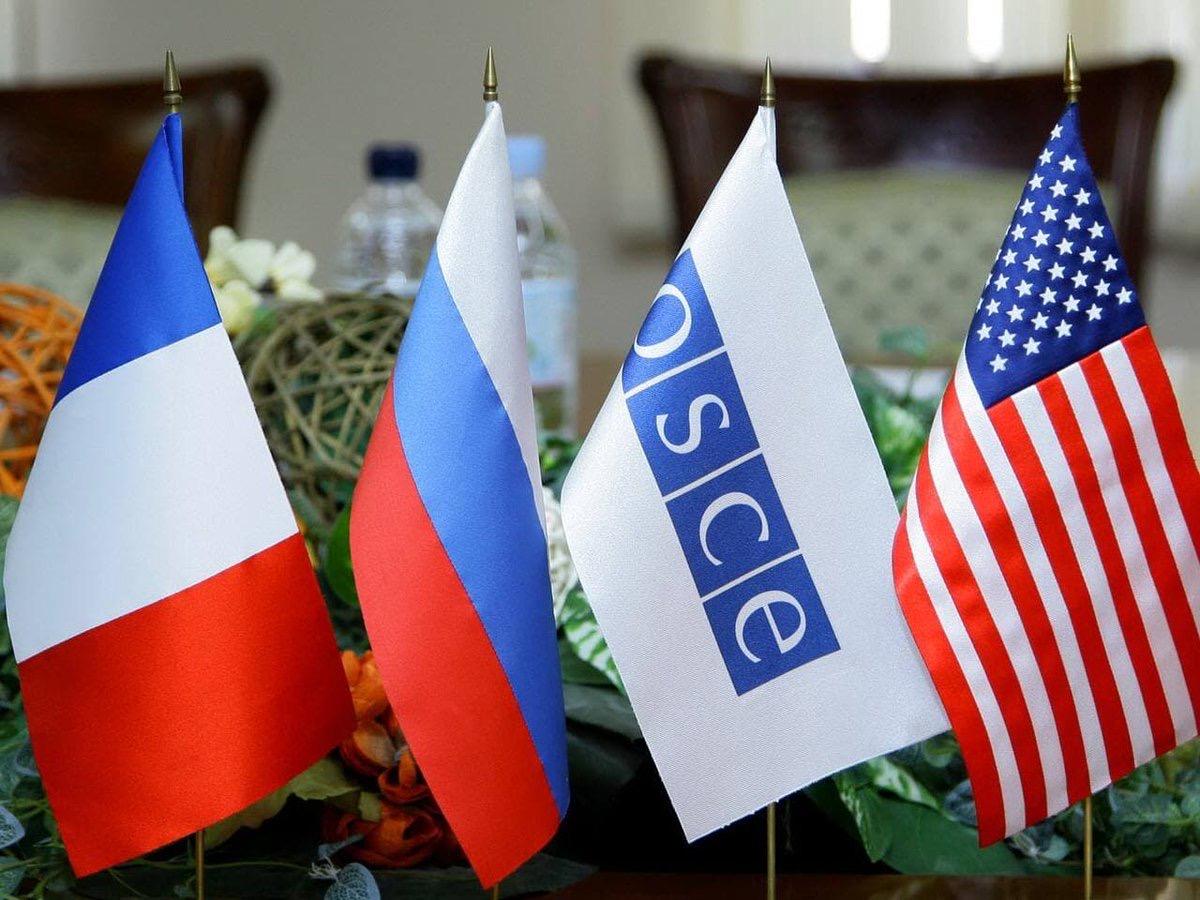Azerbaijan questions US commitment to regional stability Aid to Armenia undermines peace efforts
Despite the stalled normalization of Armenian-Azerbaijani relations, attributable to official Yerevan's inadequate policy and the Armenian authorities' refusal to adhere to the peace agenda, Armenia's Western partners persist in making customary declarations of readiness to support dialogue between Baku and Yerevan.
A statement of similar content was recently made by the official representative of the US State Department Matthew Miller at a regular briefing. "We continue to support contacts between Azerbaijan and Armenia," he noted, adding that the US also continues to make efforts to promote Azerbaijan-Armenia normalization.
So, the United States, as "the main guardians of world democracy, freedom and law", once again demonstrates its interest in establishing peace and stability in the South Caucasus. But is it really so? And what exactly is Washington's "assistance" to the Armenian-Azerbaijani settlement in the current conditions, when since the end of last year Baku and Yerevan have been engaged in direct dialogue, without mediators? Let's try to understand.
What is behind the US appeals to Baku and Yerevan?
Throughout the post-conflict period in the region, the United States has been persistently urging Azerbaijan and Armenia to engage in direct dialogue. Back in February 2021, speaking at the meeting of the OSCE Ministerial Council in Stockholm, US Secretary of State Antony Blinken said that the US welcomed the resumption of direct dialogue between Baku and Yerevan, urged the sides to resolve humanitarian issues, including demining, as well as to begin the process of border demarcation and delimitation, restore economic and transport communications.
In reality, the United States previously raised concerns about Baku's peace initiatives, which the Armenian side undermined and continues to obstruct. Moreover, the US conspicuously disregards this reality, thereby implicitly endorsing Yerevan's breach of fundamental conditions necessary for resolving relations with Baku.
The entry of Baku and Yerevan to the level of dialogue without mediators left Washington's far-reaching interests in the region out of the negotiation process. And the current excessive US activity in Armenia has shown that Washington does not intend to retreat from its interests and will push them through Yerevan, which confirms that the degree of bilateral strategic partnership has increased.
During the US Assistant Secretary of State for European and Eurasian Affairs James O'Brien’s recent visit to Yerevan, the parties agreed to change the format of the US-Armenia strategic dialogue to the Strategic Partnership Commission. The US plans to provide Armenia with funds under the Foreign Military Financing (FMF) program to facilitate its access to advanced military equipment and the latest technologies. In addition, the US will provide more than $65 million in assistance to Armenia under the pretext of strengthening its economic and political resilience.
These developments raise skepticism about Washington's genuine commitment to peacefully resolving Armenia-Azerbaijan relations and affirm the United States' openly pro-Armenian stance. Furthermore, Secretary of State Blinken's remarks expressing a desire for Armenia to be strong and independent, made after the April trilateral meeting in Brussels under the EU-US-Armenia framework, underscore this position.

Further. The United States does not exert any pressure on Armenia on the opening of transport communications in the region, but at the same time supports Pashinyan's dead-end "Crossroads of Peace" initiative. At the same time, Washington completely ignores the solution of the topical problem of demining the Azerbaijani territories liberated from Armenian occupation. Armenia has never provided Azerbaijan with accurate maps of minefields, as a result of which Azerbaijani civilians are still killed by mine explosions. However, there are periodic calls from Washington for the release from detention of war criminals of the now defunct separatist entity in Karabakh.
At the same time, the same States reproach Azerbaijan for the fact that it was able to restore its sovereignty independently by returning its ancestral territories. It is no secret that Baku's decisive actions in Karabakh in September 2023 displeased Washington. At that time, US Secretary of State Antony Blinken expressed deep US concern over the military actions and called on Baku to immediately stop them.
"These actions are worsening an already dire humanitarian situation in Nagorno-Karabakh and undermine prospects for peace. As we have previously made clear to Azerbaijan, the use of force to resolve disputes is unacceptable and runs counter to efforts to create conditions for a just and dignified peace in the region," the statement by US Secretary of State said.

Thus, the aforementioned facts confirm the unilateral position of the Americans, which is contrary to international law, and the tacit support of the United States for Armenia's destructive policy indicates the double standards of the West.
Yerevan finds itself firmly under Washington's influence
The US financial and military-political support to Armenia implies an increased dependence of official Yerevan on its new sponsors. This means that Yerevan will simply have to follow Washington's orders, up to and including military provocations against Azerbaijan, which will inevitably lead to the destabilization of the region.
This scenario suits the US because, in addition to putting an end to the normalization of Armenia-Azerbaijan relations and ensuring long-term peace in the region, it also creates real prerequisites for turning Armenia into a US military outpost and the presence of US bases there in the future. However, for this to happen, Armenia will have to completely withdraw from Russia's orbit of influence. But so far Yerevan is only imitating the exit "from under Moscow's wing" by demarches towards the Collective Security Treaty Organization (CSTO) and generally anti-Russian attitude. However, judging by Washington's activation and pressure in Armenia, the latter's springboard for maneuvers is rapidly shrinking.
What does Azerbaijan seek?
In order to settle relations with Armenia and establish lasting peace in the region, Baku requires Yerevan to revise the constitution, which retains territorial claims to Azerbaijan. Official Baku has categorically stated that it is impossible to conclude a peace treaty with Yerevan without making appropriate amendments to the basic law. In this regard, it would be logical if the United States, which "advocates peace in the region," put pressure on Armenia on this issue of fundamental importance for Baku. However, Washington's silence rather suggests that Armenia has secured the support of the United States in preserving its territorial claims to Azerbaijan in its constitution.
Baku has made its position on this issue clear. Azerbaijani President Ilham Aliyev, at a recent meeting with the heads of parliaments of the member states of the Parliamentary Assembly of Turkic States (TURKPA), emphasized: "It is simply impossible to conclude a peace agreement between Armenia and Azerbaijan while the current constitution of Armenia remains unchanged.
This is Azerbaijan's first precondition, which not only Armenia must internalize, but also Washington must reckon with.

Secondly, Baku is in favor of the de jure dissolution of the essentially dead OSCE Minsk Group. During a recent telephone conversation with US Secretary of State Antony Blinken, President Ilham Aliyev stated unequivocally that it is high time to officially terminate the activities of the non-functioning OSCE Minsk Group and all related institutions in order to completely close the page on the conflict.
Earlier Baku proposed Yerevan to jointly apply to the OSCE for the legal abolition of the Minsk Group. At the same time, Ilham Aliyev emphasized that "if Armenia prefers to maintain the Minsk Group, then their territorial claims against us will be continued".
The stance of the States that viewed the OSCE Minsk Group as a diplomatic instrument for shaping regional dynamics is of particular interest in this context.
Summarizing the material, the following conclusion emerges. At the current stage, when Armenia is actively arming itself with Western weapons, following France's lead, and is hatching plans for revenge, any US support for Armenia, including in the issue of maintaining territorial claims to Azerbaijan, increases the likelihood of unleashing a new war in the region, and thus the realization of dangerous plans of a destructive nature in the South Caucasus.
Azerbaijan is ready for any scenario. The only question is whether Armenia itself realizes that it is becoming a pawn in someone else's games, which will not end well for it.








